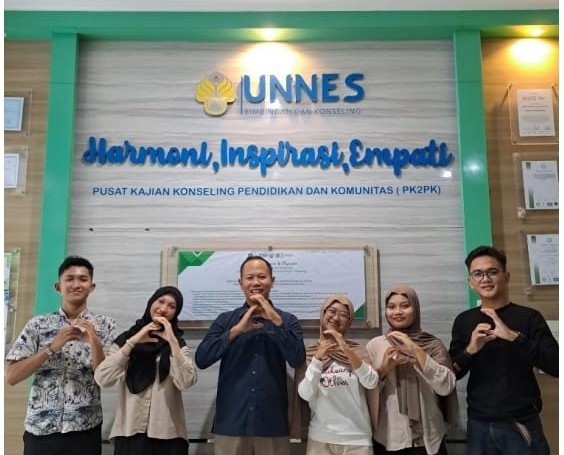UNNES Students Research Javanese Local Wisdom to Recover Sextortion Victims
By: Nur Fateah, Lecturer in Javanese Language Education, Faculty of Social and Political Sciences, Unnes
The rise in threats and extortion based on intimate content (sextortion) in digital spaces prompted the Student Creativity Program (PKM-RSH) team at Semarang State University to seek a healing approach that resonates with the victims’ experiences. Departing from concerns about the stigma, shame, and lack of support that often keep survivors silent, the team positioned Javanese local wisdom as a gateway to humane recovery. The Student Creativity Program (PKM-RSH) team at Semarang State University examined how Javanese local wisdom helps sextortion survivors recover from trauma through the framework of Post-Traumatic Growth Theory (PTG). The team was chaired by Maharani Jiny Prasanda, with members Nabilatun Nisa, Siti Qoni’ah, Cikal Madani, and Haikal Erlangga Dharmaputra. The research focuses on three mutually reinforcing cultural practices:
1. Mangasah mingising budi: sharpening inner clarity, accepting emotions without self-blame, affirming dignity, and restoring a sense of security.
2. Memusuh malaning bumi: “cleansing” negative experiences, reducing stigma, tidying up digital footprints, preserving evidence, and preparing safe reporting procedures.
3. Hamemayu hayuning bawana: maintaining harmony within the environment through social support, healing language, and friendly social networks.
Preliminary findings (PTG):
1. New possibilities: new possibilities for life direction and development opportunities.
2. Appreciation of life: greater appreciation for life and meaning in safety or education.
3. Spirituality change: changes in the intensity of spirituality and deepening the meaning of experiences.
4. Personal strength: the personal power to set boundaries, say “no,” and make safe decisions.
5. Relating to others: Strengthening social relationships, being more open to seeking support from family, friends, and the social community.
Initial findings show signs of post-traumatic growth: increased appreciation for life, warmer relationships, and growing self-confidence. The team hopes these recommendations will encourage a more victim-friendly campus ecosystem, from clear policies and easily accessible counseling services to sustainable digital literacy. In essence, combining Javanese cultural values with a scientific approach provides a humane and empowering space for sextortion survivors to recover.**
Semarang, October 15, 2025
—-
![]()




